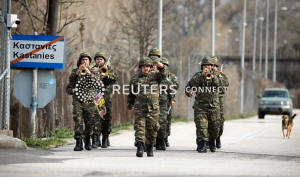In migrant crisis, Greece caught between EU job descriptions
 Send a link to a friend
Send a link to a friend
[March 12, 2020]
By Luke Baker
ATHENS (Reuters) - When the current
European Commission took office in December, its president, Ursula von
der Leyen, created the role of a commissioner for 'Promoting our
European Way of Life' and handed the job to a Greek politician.
The job title was originally 'Protecting our European Way of Life', but
it was criticized for sounding xenophobic. Ironically, it is Greece that
now finds itself caught between promoting and protecting what the EU
stands for.
Since Feb. 28, when Turkish President Tayyip Erdogan said he was opening
the border and invited migrants and refugees based in Turkey - estimated
at nearly four million - to cross into the EU, Greece has become
Europe's bulwark against mass migration.
Erdogan made the move because he said the EU was no longer abiding by a
2016 deal under which Brussels offered 6 billion euros of aid to Ankara,
provided it kept the refugees in Turkey.
Thousands of men, women and children from Syria, Iran, Afghanistan and
as far afield as Morocco and Pakistan are now camped on the Turkish
border, hoping to cross the Evros river and a steel-and-barbed-wire
fence into Greece.
On March 1, Athens announced it was suspending asylum applications for a
month, allowing for the immediate deportation of any migrants seized.
Security forces say they have stopped nearly 45,000 people entering
Greece in the past two weeks, with hundreds arrested and sent back.
EU leaders are desperate to avoid a repeat of the 2015/16 migrant
crisis, when around one million people flooded into the bloc from
Turkey, putting huge strain on national social services and straining
relations among member states.
But in taking such a hard line, Greece has opened itself to criticism
that it is flouting international humanitarian law and that the EU,
which presents itself as a bastion of human rights and democracy, is an
unwelcoming fortress.
NAZIS OR EUROPE'S SHIELD?
In the Turkish parliament on Wednesday, Erdogan showed members of his AK
Party video footage of Greek security forces driving migrants back from
the border and he compared them to Nazis.
[to top of second column]
|

Greek military band members play national anthem near Turkey's
Pazarkule border crossing, in Kastanies, Greece March 10, 2020.
REUTERS/Florion Goga

"Opening fire on innocent people, exposing them to all kinds of
inhumane treatment... is barbarism in the full sense of the word,"
he said, repeating a call for Greece to let the migrants cross and
reach richer western European countries.
Greece, which denies that its forces are shooting at migrants, will
find it especially galling to hear such criticism from Erdogan, long
under fire from the EU over Turkey's own human rights record.
As well as wanting the EU to offer more cash and to fulfill other
parts of the 2016 deal on customs rules and visas for Turks, Erdogan
wants explicit European backing for his military engagement in
Syria.
As a core member of NATO, to which most EU countries also belong,
Turkey is sending the message that allies should be more grateful
for what it is doing to check Russian influence in Syria and to try
to bring order to warring Libya.
For Greece, which has endured a financial meltdown and one migration
crisis already in the past decade and is now bracing for the fallout
from the coronavirus pandemic, the first priority is stability and
defending its borders.
The European Commission has thus far given Athens full backing. Von
der Leyen has described Greece as Europe's 'aspida', the Greek for
shield. "Our first priority is to ensure order is maintained at the
Greek external border, which is also a European border," she said
last week.
But after the New York Times reported on Tuesday that Greece was
running a secret "black site" close to the border, holding migrants
without access to lawyers or the ability to make asylum claims, - a
claim denied by Athens - von der Leyen may have to find words that
refer to the need to promote Europe's way of life, not just protect
it.
(Editing by Gareth Jones)
[© 2020 Thomson Reuters. All rights
reserved.] Copyright 2020 Reuters. All rights reserved. This material may not be published,
broadcast, rewritten or redistributed.
Thompson Reuters is solely responsible for this content. |